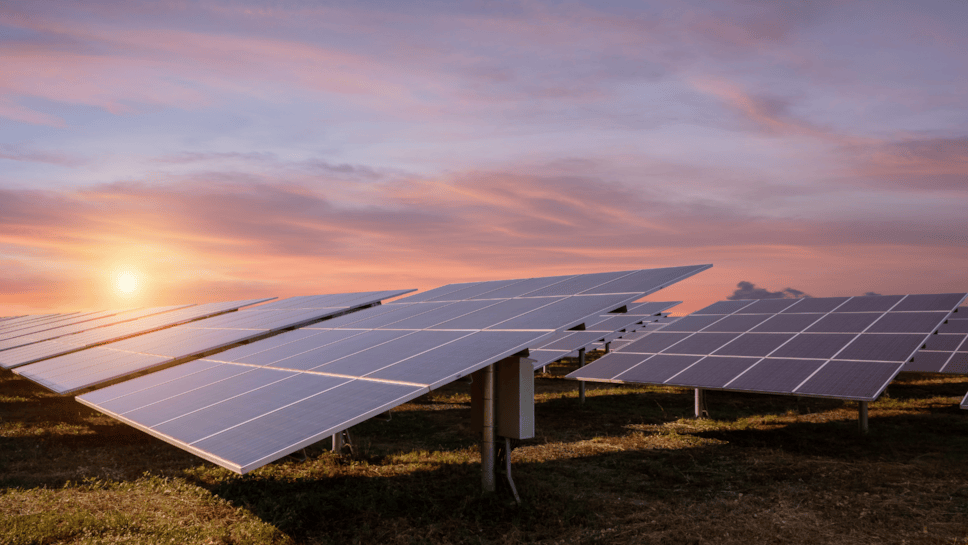
Why clean tech is proven, but progress still stalls
Heat pumps beat boilers. Battery storage is booming. Smart meters, solar panels, EV chargers – they’re all here. So why isn’t net zero happening faster?
It’s not for lack of technology. From flexible batteries stabilising the grid to community energy models making solar more accessible, the tools for a greener future already exist – and in many cases, they’re working brilliantly. But despite the innovation, progress often feels stuck in second gear.
The barriers? Misconceptions, affordability, access, and outdated infrastructure. It's time to bust the myths and clear the roadblocks holding clean tech back from racing ahead.
Myth: Renewables don’t work
Our solution: Battery storage
As renewables take up more of the UK’s energy mix, generation is becoming more dependent on weather, daylight hours, and seasonal shifts – as well as the changing demands of consumers. In fact, 2024 was the cleanest year ever for UK electricity. Low-carbon sources provided a record-breaking 58% of the grid’s energy, with wind power officially overtaking gas as the nation’s top energy source.
This means we need smarter, more flexible infrastructure to ensure that reliable supply of power.
Battery storage systems help stabilise the grid by balancing supply and demand in real time. That means fewer fossil fuel power plants, better use of green energy, and a buffer against the ups and downs of energy prices – helping lower costs for customers.
Flexible assets such as battery energy storage systems are playing a key role in the energy transition.
We’re installing grid-scale batteries that store renewable energy when supply is high and release it when demand spikes. At the former Uskmouth coal-fired power station site in Newport, South Wales, we’re developing two 115MW batteries – helping to reimagine the site for a more sustainable, flexible future.
Myth: Clean tech is out of reach
Our solution: Energy sharing
Green energy – particularly solar power - doesn't have to be exclusive to those who can afford the upfront investments.
We’re exploring ways to develop community energy across the UK – unlocking solar power for more people and places. Our Community Energy model lets organisations and households tap into renewable energy without many of the financial hurdles. We install photovoltaic systems and share excess energy with the community at discounted rates. That reduces transmission costs, boosts local resilience, and supports small businesses and community causes.
By removing the entry barriers to solar, we’re helping to widen the opportunity of clean energy and create a more collaborative energy ecosystem. With regulatory changes already in place in Europe, community energy is set to become an even more powerful tool for greener growth – empowering people to generate, share, and save energy as part of something bigger.
And in other areas… we’re also working with Amber, a smart energy platform that gives solar, battery, and EV customers real-time access to dynamic energy prices. That means they can charge when electricity is cheap, sell back when it’s expensive, and unlock the full value of their home batteries.
And in Coventry, we’ve launched a pilot programme supporting vulnerable households with fully funded batteries, solar panels, and time-of-use tariffs — combined with debt relief, energy-efficient appliances and insulation. It’s a holistic approach to tackling high bills and future-proofing homes.
Myth: Clean tech breaks the bank
Our solution: Energy-as-a-Service (EaaS)
One reason clean tech progress still stalls is cost – it’s too expensive upfront for many households. But Energy as a Service (EaaS) is changing that.
EaaS is a subscription-style service for heat pumps and solar panels with no upfront payment needed. Think of it like a mobile phone contract, but instead of a handset you’re getting your home kitted out with low-carbon tech like solar panels and heat pumps.
By spreading the cost of installation and operation over time, we make sustainability more accessible. And by working with government and industry partners, our vision is to bring this to every household that wants it – with no need for loans, no major savings required, and no hassle.
Myth: New homes aren’t built green
Our solution: Build homes fit for the future
Eco-friendly solutions should be standard in every new home – and we’re working to make that a reality.
We’ve worked with Eco2Solar for nearly five years now. They are the UK’s leading installer of solar photovoltaic (PV) systems on new build homes. Their mission is to make solar standard – a viable, cost-effective option for developers and homebuyers alike.
Starting with individual homes, they’ve now scaled up to partner with some of the UK’s biggest housebuilders – including Barratt, Redrow, Taylor Wimpey, Wain Homes, Keepmoat, and Persimmon – installing solar panels on hundreds of properties up and down the country each and every day.
Myth: The key to more clean energy? Wasting less of it
Our solution: We can use the waste!
Why waste heat, when we can repurpose it?
From capturing server heat in East London to warm entire neighbourhoods, to tapping into sewage (yes, really) as a clean energy source – we’re using what's already there to power what’s next. We’re also scaling up geothermal systems beneath our cities, testing EVs that can return electricity to the grid, and using AI to predict heating needs with pinpoint accuracy.
These are just a few of the ways we’re reducing emissions, supporting the circular energy economy, and making the most of every kilowatt – one clever, warm-hearted solution at a time.
By busting myths and breaking barriers, we’re shaping a future where clean energy isn’t just a possibility – it’s the default. Progress may be stalling, but the solutions are already here. All it takes now is the will, the support, and the action to put them in motion.
Let’s make clean tech the norm – not the niche.
